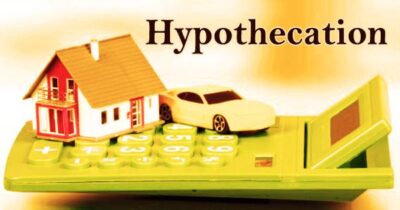Whether you want to invest in real estate or simply buy a single-family house, you’ll almost certainly need to acquire mortgage financing first. A hypothecation agreement is one approach for obtaining finance that is most typically used when purchasing commercial real estate.
However, hypothecation can be employed in a variety of ways to assist you in financing your property investment. Hypothecation can help lower mortgage costs and interest. It can also assist people who may not appear to be the best on paper in obtaining a loan. Here’s all you need to know about hypothecation to help you decide if it’s the best way for you to acquire finance.
What Is Hypothecation?
When an asset is pledged as collateral to obtain a loan, this is known as hypothecation. The asset’s owner does not relinquish title, possession, or ownership rights, such as the revenue generated by the asset. However, if the terms of the agreement are not met, the lender has the right to confiscate the asset. Hypothecation is not the same as a mortgage, lien, or assignment.
Mortgage Hypothecation
The most typical instance of hypothecation is in mortgage loans. A mortgage is a sort of loan that is secured by real estate. Although the borrower theoretically owns the house, because it is pledged as collateral, the mortgage lender has the right to seize it if the borrower fails to meet the repayment terms of the loan agreement, which occurred during the foreclosure crisis.
Similarly, auto loans are secured by the underlying vehicle. Unsecured loans, on the other hand, do not operate with hypothecation. This is because there is no collateral to claim in the event of failure. Because hypothecation gives security to the lender due to the collateral pledged by the borrower, it is easier to acquire a loan. Thus, the lender may provide a lower interest rate than on an unsecured loan.
Though lenders cannot claim collateral for defaulted unsecured loans, they can pursue alternative debt collection methods, such as a creditor lawsuit.
Hypothecation in Investing
Another popular type of hypothecation is margin lending in brokerage accounts. When an investor trades on margin, he or she borrows money from the brokerage. This enables individuals to use their existing account balances to make larger investments and potentially profit more from the sale of securities.
However, this sort of hypothecation might be dangerous. When an investor chooses to buy on margin or sell short, they are accepting that the securities can be sold if a margin call occurs. The investor owns the securities in their account. However, the broker has the right to sell them if the broker issues a margin call that the investor is unable to satisfy in order to cover the investor’s losses.
This can be expensive for the investor because it can magnify losses far beyond the initial investment. As a result, it’s critical to grasp how margin trading works and what hypothecation could entail for you personally.
When should a hypothecation agreement be used in real estate?

The most typical application of hypothecation is in commercial real estate transactions. Lenders frequently want greater collateral with commercial real estate investments since these sorts of investments and buildings are riskier. Furthermore, depending on the perceived worth of the investment location or property type, your lender may want higher monetary collateral.
Hypothecation can also be utilized as a useful tactic for real estate investors to improve loan terms. You may be able to reduce your interest rate by putting up additional collateral. If you’re looking for an unsecured loan, you could potentially sign into a hypothecation agreement. Unsecured loans usually do not require collateral and rely only on your credit score. However, if your credit score is low, you can use hypothecation and put up collateral to position yourself as a smaller risk to the bank.
While hypothecation is more commonly utilized in commercial real estate transactions, it can also be employed in residential real estate. If you have a low credit score, a low net worth, are unable to demonstrate a consistent income or have a high loan-to-value ratio and debt-to-income ratio, your lender will view you as a bigger risk and may be unwilling to provide you a loan.
Hypothecation, on the other hand, can help to mitigate your danger. You can alleviate your lender’s fears and obtain mortgage approval by supplying additional assets as security. Of course, whether you establish a hypothecation agreement for business investments or for a residential residence, you accept the risk of losing your collateral. Prepare to lose that asset if you are unable to repay your lender.
Examples of Hypothecation Agreement
Mortgage loans are the most common type of real estate hypothecation. A rental property, for example, may be hypothecated as security against a bank mortgage. The bank has no claim on rental income while the property is still collateral; but, if the landlord fails on the loan, the bank may confiscate the property by commencing a foreclosure procedure.
The use of hypothecation in real estate contracts might provide some confidence to lenders who seek to reduce risk when lending money. If the borrower fails to make payments for any reason, the bank may be able to recuperate some of its losses if it is able to foreclose and subsequently resell the property. In this way, it helps to stabilize the mortgage lending business.
Borrowers can benefit from hypothecation as well. They may find it easier to get mortgage loans with lower down payments or credit score requirements. They might also be able to qualify for lower interest rates because the lender is taking on less risk.
Foreclosure can be extremely harmful to your credit score. So, if you’re having trouble making mortgage payments, it may benefit you to contact your lender to discuss possible solutions.
What Is the Difference Between Hypothecation and a Mortgage?
The offering of an asset as security for a loan without transferring title to the lender is known as hypothecation. In a mortgage, the purchased property is used to finance the debt, but the lender retains the title.
Is Hypothecation the Same as Assignment?
An assignment is a contractual arrangement. In an assignment, one party allocates rights and responsibilities defined in a contract to another party. Hypothecation permits a borrower to keep property while using it as collateral for a loan.
What Is the Difference Between a Hypothecation and a Lien?
The borrower is permitted to keep the property used as collateral for the loan under hypothecation. The borrower agrees to repay the loan with the condition that the lender may repossess the property if they don’t. A lien, on the other hand, forces a property owner to satisfy existing debts before refinancing or selling an underlying property.
What’s the Difference Between a Pledge and Hypothecation?
A pledge and hypothecation are frequently misunderstood by one another and appear to be the same on the surface. However, a significant distinction exists between the two. This may influence whether you agree to a pledge or a hypothecation agreement.
A pledge, like hypothecation, can use a valued item to finance a mortgage or loan. A pledged asset can also help you save money on your down payment or get a better interest rate or repayment terms. The key difference is that a pledged asset is transferred to your lender.
If you make a pledge, your lender will have custody of your collateral. And, he will be able to sell it if you default on your loan. You always keep possession of your collateral when you use hypothecation. If you fail to repay your obligation, your lender will have to confiscate your collateral assets in order to recoup their investment.
What Is The Difference Between Hypothecation and Collateral?
When a valuable asset is pledged as collateral for a loan, the lender gains security in the event that the borrower does not follow the conditions of the loan arrangement. The borrower retains ownership of the pledged asset in a hypothecation agreement, while the lender places a lien on the asset.
What is a Hypothecation Agreement?
A hypothecation agreement is used to secure a loan or mortgage by using an asset as collateral. Another real estate property, your principal house, or a moveable item such as a car, boat, or stock can be pledged as collateral. In the unfortunate event that you default on your loan and are unable to repay it to the lender, the lender will have the authority to confiscate your collateral asset.
You, as the borrower, retain ownership of the property or other asset used as security with hypothecation. The lender does not acquire ownership of the asset. Your lender is also not permitted to get any income or revenue from your collateral asset. If you promise a rental property, for example, your lender is not permitted to collect rent. Alternatively, if you offer up stocks as security, your lender will be unable to cash them in or receive dividends.
You can enter into a hypothecation agreement. However, before agreeing to hypothecation, your bank or lender may need you to meet a few criteria. For example, before your lender agrees to a hypothecation agreement, the collateral you provide may need to be of a certain monetary value.
When it comes to the type of collateral that can be used in hypothecation, lenders prefer assets with an equitable title. This means that even if you’re still paying off a mortgage or have debt on the item you’re using as collateral, your lender will accept it as collateral as long as there’s sufficient value and equity.
What is the purpose of a hypothecation agreement?
To further understand how hypothecation works, pretend you want to get a home loan but don’t have enough money to cover the complete down payment. For example, if the down payment is $20,000 but you only have $10,000, you can sign a hypothecation agreement and put up an asset as collateral to make up the difference.
Once you and your lender have reached an agreement on conditions, you will both enter into a promissory note, which is a financial tool that comprises a written commitment with clauses indicating that you will pay the other party. Your lender will then be able to approve a mortgage with a hypothecation agreement that incorporates your collateral.
Is it necessary to enter into a hypothecation agreement?
The decision to enter into a hypothecation agreement is totally dependent on your situation and level of risk tolerance. If you can’t afford to lose the assets you’d use as security, hypothecation may not be the best option. For example, if your car is essential to your livelihood, you might not want to put it up as collateral. You might wish to look into other options for funding.
What Are Hypothecation Charges?
The term “hypothecation charges” refers to the additional fee that vehicle owners must pay at the RTO when obtaining an RC without the bank’s name on it. As a result, after submitting the bank’s NOC, you will have to pay a fee before you can obtain the new RC.
Is Hypothecation A Fixed Charge?
When a specific existing property is hypothecated, a ‘fixed’ charge is produced. The floating charge is a charge imposed generally on the debtor’s assets at any given moment in time during the term of the hypothecation deed.
What Is Rehypothecation?
Rehypothecation occurs when banks and brokers utilize hypothecated collateral as security to back their own transactions and trades with their client’s agreement in order to get a reduced cost of borrowing or a fee refund. For example, the lender may use an apartment building that was previously used as collateral for a commercial real estate loan as collateral for a new loan. This freshly produced debt has now been converted into a derivative.
The Securities and Exchange Commission regulates rehypothecation. To do so, banks and lenders must obtain approval from the owner of the property or assets.
Note
Due to the negative impact this technique had during the 2008 financial crisis, rehypothecation by banks and financial institutions is a less widespread practice nowadays.
What Does Hypothecation Termination Mean?
Hypothecation application is an application for the termination of a hire purchase, lease, or hypothecation agreement.
In Conclusion,
Hypothecation is frequently used in real estate lending agreements, where a property is used as collateral for a loan. However, it can also be employed in other types of lending situations and for investing. If you sign onto a loan agreement that incorporates hypothecation, you should be aware of the potential ramifications if you fail to meet your financial obligations to the lender.
Hypothecation FAQs
What is the difference between hypothecation and mortgage?
The difference between hypothecation and mortgage is that hypothecation does not surrender title or possession, while a mortgage involves the owner surrendering the title of the property to the lender.
What is the difference between lien and hypothecation?
Although the lender is “hypothetically” in control of the collateral in hypothecation, the debtor is usually not required to surrender over physical custody of the collateral. A lien is a formal claim of debt against anything.
How long does it take to remove hypothecation?
The removal of hypothecation takes between 4 and 20 working days.
Can hypothecation be converted to pledge?
If the bank suspects that the borrower is attempting to defraud it, it can convert the hypothecation to a pledge.






